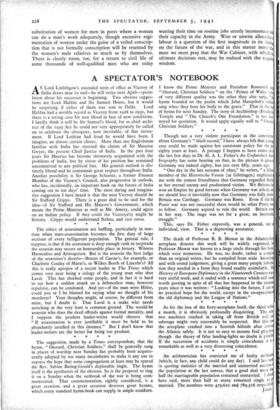The ethics of assassination are baffling, particularly in war- time
when mass-assassination becomes the first duty of large sections of every belligerent population. The general rule, I suppose, is that if the assassinee is deep enough sunk in turpitude the assassin may secure an honourable place in history. Witness Harmodius and Aristogeiton. But is the assassin the best judge of the assassinee's deserts—Brutus of Caesar's, for example, or Charlotte Corday of Marat's, or Wilkes Booth of Lincoln's? All this is really apropos of a recent leader in The Times which comes very near being a eulogy of the young man who shot Laval. This has shocked some people, and in fact it is hard to see how a sudden attack on a defenceless man, however repulsive, can be condoned. And yet—if the man were Hitler, could you or I be blamed for saying what we thought of his murderer? Your thoughts might, of course, be different from mine, but I doubt it. That Laval is a snake who needs scotching at the very least is common ground. The would-be assassin who does the deed offends against formal morality, and I suppose the prudent leader-writer would observe that " If assassination is ever justifiable it must be held to be abundantly justified in this instance." But I don't know that leader-writers are the better for being too prudent.
* * * *


























 Previous page
Previous page